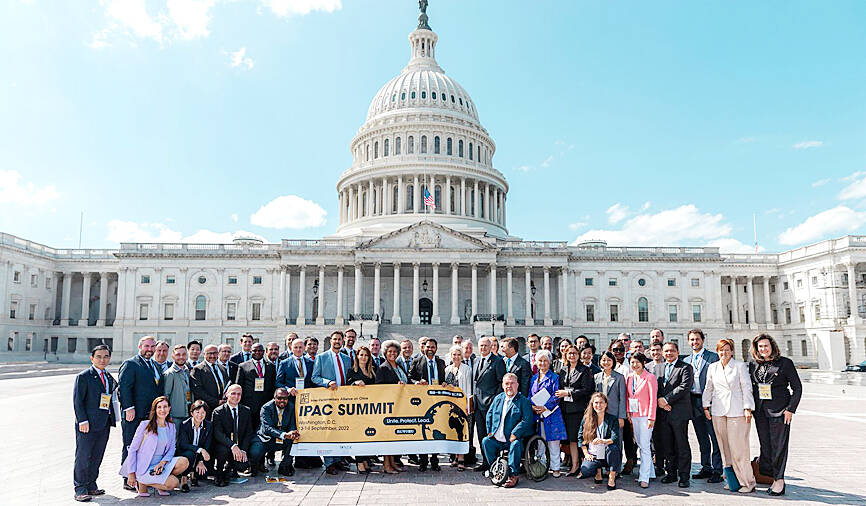Cross-strait issues would be among the top items on the agenda in the annual summit of the Inter-Parliamentary Alliance on China (IPAC) to be held in Taipei tomorrow, which would also include a “Taiwan session,” during which President William Lai (賴清德) and Deputy Minister of Foreign Affairs Tien Chung-kwang (田中光) are to deliver speeches.
This would be the first IPAC summit held in Taiwan, and is also the first IPAC summit to be held in a non-member nation, Democratic Progressive Party (DPP) Legislator Fan Yun (范雲) said, adding that this demonstrates that the world supports Taiwan.
Cross-strait stability is one of the highlights on the summit’s agenda this year, with related issues to be discussed by governmental officials and the world’s best experts, sources said yesterday.

Photo: Screen grab from the IPAC’s Web site
Another highlight is cybersecurity, as in March more than 400 e-mail accounts associated with IPAC were attacked by the Chinese hacking group APT31, the IPAC said.
The Ministry of Foreign Affairs in a statement yesterday said that a total of 49 lawmakers and politicians from 23 countries and the European Parliament would take part in the event, including Australian Senator Deborah O’Neill, Czech lawmaker Eva Decroix and French Senator Olivier Cadic.
The IPAC has become even more significant with the rise of party disagreements and political violence, as it is “creating space for consensus across party lines” and facilitates “compromise across the spectrum,” European Parliament Vice-President Pina Picierno was quoted as saying in an IPAC news release published on Tuesday last week.
“Some issues transcend party and geography” and “Taiwan is undoubtedly one of those issues,” she was quoted as saying.
“There has never been a more important time to stand with Taiwan,” British Member of Parliament Tom Tugendhat was quoted as saying in the IPAC news release.
The solidarity demonstrated by the summit shows that “cross-strait stability is high in the minds of lawmakers around the world, from all sides of the political spectrum,” he said.
Meanwhile, sources said the IPAC has expressed hope that Taiwan’s opposition legislators would take part in the event after it learned they might not.
While Taiwan People’s Party Legislator Wu Chun-cheng (吳春城) has said he would attend the summit, Chinese Nationalist Party (KMT) lawmakers had yet to give a positive response as of Saturday, they said.
The IPAC has not granted Taiwan membership, as it requires joint participation by the ruling and opposition parties, DPP Legislator Wang Ting-yu (王定宇) said on Saturday.
The KMT’s opting out of the event for years is because of its fear of displeasing China, he said.
The opposition lawmakers should stand by their country and honor their commitments to parliamentary diplomacy, DPP caucus secretary-general Rosalia Wu (吳思瑤) said.
The opposition should not take the opposite side of democracy, she added.
KMT caucus deputy secretary-general Lin Szu-ming (林思銘) on Saturday said he did not receive any invitation from the IPAC.
KMT Legislator Hsu Chiao-hsin (徐巧芯) also said her office had not received an IPAC invitation to the summit.
Additional reporting by Liu Wan-lin,
Chen Cheng-yu and Li Wen-hsin

Nipah virus infection is to be officially listed as a category 5 notifiable infectious disease in Taiwan in March, while clinical treatment guidelines are being formulated, the Centers for Disease Control (CDC) said yesterday. With Nipah infections being reported in other countries and considering its relatively high fatality rate, the centers on Jan. 16 announced that it would be listed as a notifiable infectious disease to bolster the nation’s systematic early warning system and increase public awareness, the CDC said. Bangladesh reported four fatal cases last year in separate districts, with three linked to raw date palm sap consumption, CDC Epidemic Intelligence

Two Taiwanese prosecutors were questioned by Chinese security personnel at their hotel during a trip to China’s Henan Province this month, the Mainland Affairs Council (MAC) said yesterday. The officers had personal information on the prosecutors, including “when they were assigned to their posts, their work locations and job titles,” MAC Deputy Minister and spokesman Liang Wen-chieh (梁文傑) said. On top of asking about their agencies and positions, the officers also questioned the prosecutors about the Cross-Strait Joint Crime-Fighting and Judicial Mutual Assistance Agreement, a pact that serves as the framework for Taiwan-China cooperation on combating crime and providing judicial assistance, Liang

Reports of Taiwanese going missing, being detained or interrogated, or having their personal liberties restricted in China increased about fourfold annually last year, the Mainland Affairs Council (MAC) said yesterday. Last year, 221 Taiwanese who traveled to China were reported missing, were detained and interrogated, or otherwise had their personal freedom restricted, up from 55 the previous year, the council said. Reopening group tours to China would be risky, as it would leave travelers with no way to seek help through official channels after Beijing shut down dialogue between the associations tasked with handling cross-strait tourism, the MAC said. Taipei’s Taiwan Strait Tourism

SHIFT: Taiwan is evolving from a transit stop into a tourist destination, with more international travelers willing to spend on tours, dining and cultural activities Taiwan rose three places in the World Tourism Barometer to 36th globally in 2024, with international tourism revenue of US$10.028 billion, the Tourism Administration said on Monday. The UN Tourism Organization publication said that its focus has switched from whether a country has returned to pre-COVID-19 levels of tourism to the amount spent by a tourist during an overseas trip. The nation last year welcomed 8.57 million international tourists, about 9 percent more than in 2024, with most tourists coming from Japan, South Korea, and Hong Kong and Macau, all of which accounted for at least 1 million tourists each. During the first